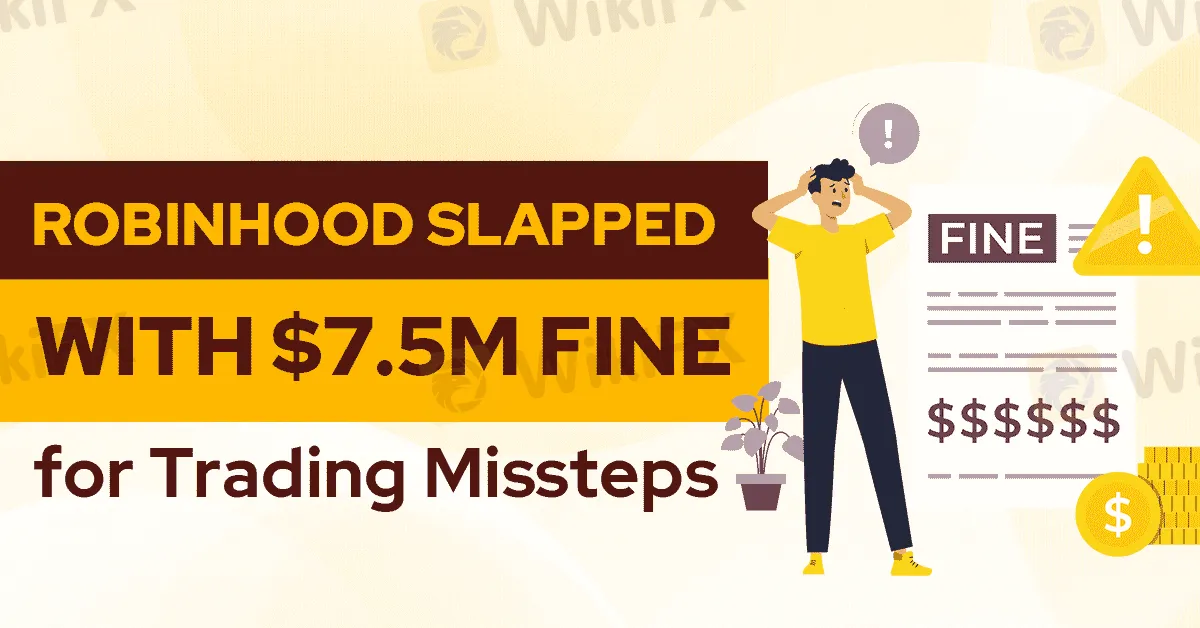简体中文
繁體中文
English
Pусский
日本語
ภาษาไทย
Tiếng Việt
Bahasa Indonesia
Español
हिन्दी
Filippiiniläinen
Français
Deutsch
Português
Türkçe
한국어
العربية
Robinhood Slapped with $7.5M Fine for Trading Missteps
Abstract:Robinhood agrees to a $7.5 million fine in a settlement with Massachusetts regulators over allegations of encouraging risky trades among inexperienced investors, addressing concerns of platform outages and aggressive marketing tactics.

Robinhood, the no-fee trading app, has reached an agreement to pay a $7.5 million fine and overhaul its operational practices following a settlement with securities regulators in Massachusetts.
The settlement stems from allegations that Robinhood encouraged inexperienced investors to participate in risky trades, addressing an administrative enforcement action initiated in 2020 by Massachusetts Secretary of State Bill Galvin. The action contended that Robinhood's platform design and marketing strategies amounted to the “gamification” of trading, boosting user engagement but risking the promotion of hazardous trading behaviours among inexperienced investors.
The enforcement arm of the Massachusetts Securities Division found that Robinhood failed to prevent frequent outages and disruptions on its trading platform. The platform also employed aggressive marketing tactics to attract inexperienced traders, utilizing “gamification methods to control clients.”

Despite reporting limited or no investing expertise, Robinhood's own calculations revealed that 68% of its Massachusetts-based customers were authorized to trade options.
In December 2020, the Secretary of the Commonwealth of Massachusetts, William Galvin, filed a lawsuit against Robinhood, accusing the platform of aggressively marketing to inexperienced investors and exposing them to unnecessary risks. The lawsuit also claimed that Robinhood failed to adequately screen customers for eligibility to trade options.
Robinhood has encountered multiple legal challenges and regulatory investigations, leading to commitments to collaborate with regulators to address concerns and implement platform changes. In April 2022, the North American Securities Administrators Association (NASAA) imposed a $10.2 million penalty on Robinhood for poor communications with customers and trading outages in 2020.

Disclaimer:
The views in this article only represent the author's personal views, and do not constitute investment advice on this platform. This platform does not guarantee the accuracy, completeness and timeliness of the information in the article, and will not be liable for any loss caused by the use of or reliance on the information in the article.
Read more

Financial Educator “Spark Liang” Involved in an Investment Scam?!
A 54-year-old foreign woman lost her life savings of RM175,000 to an online investment scam that promised high returns within a short timeframe. The scam was orchestrated through a Facebook page named "Spark Liang."

The Hidden Checklist: Five Unconventional Steps to Vet Your Broker
Forex broker scams continue to evolve, employing new tactics to appear credible and mislead unsuspecting traders. Identifying these fraudulent schemes requires vigilance and strategies beyond the usual advice. Here are five effective methods to help traders assess the legitimacy of a forex broker and avoid potential pitfalls.

Doo Financial Obtains Licenses in BVI and Cayman Islands
Doo Financial, a subsidiary of Singapore-based Doo Group, has expanded its regulatory footprint by securing new offshore licenses from the British Virgin Islands Financial Services Commission (BVI FSC) and the Cayman Islands Monetary Authority (CIMA).

CFI’s New Initiative Aims to Promote Transparency in Trading
A new programme has been launched by CFI to address the growing need for transparency and awareness in online trading. Named “Trading Transparency+: Empowering Awareness and Clarity in Trading,” the initiative seeks to combat misinformation and equip individuals with resources to evaluate whether trading aligns with their financial goals and circumstances.
WikiFX Broker
Latest News
AIMS Broker Review
The Hidden Checklist: Five Unconventional Steps to Vet Your Broker
Russia to Fully Ban Crypto Mining in 10 Regions Starting January 1, 2025
YAMARKETS' Jingle Bells Christmas Offer!
Why is there so much exposure against PrimeX Capital?
Two Californians Indicted for $22 Million Crypto and NFT Fraud
WikiFX Review: Is Ultima Markets Legit?
Colorado Duo Accused of $8M Investment Fraud Scheme
MTrading’s 2025 "Welcome Bonus" is Here
Malaysia Pioneers Zakat Payments with Cryptocurrencies
Currency Calculator


